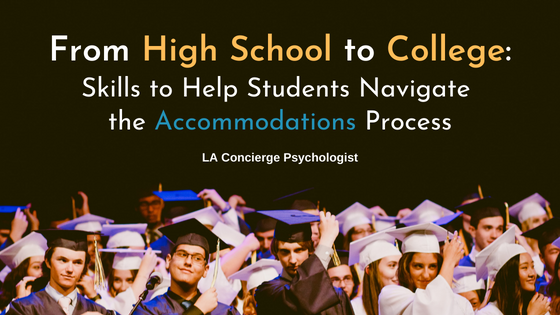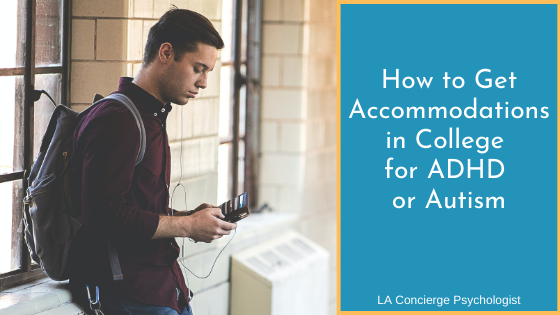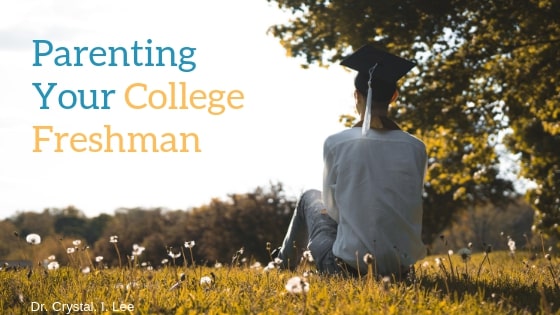This blog post—the first in a two-part series—provides examples of college accommodations that may be available for students with autism and ADHD under the Americans with Disabilities Act (ADA). Read Part 2 for instructions on how to request ADA college accommodations.
As autism therapists and ADHD specialists, we speak with many parents who want their neurodivergent children to get the same accommodations in college they did in high school. We also work with parents who think college accommodations don’t exist. The truth is somewhere in between.
If your child has a diagnosis of ADHD, autism, or another qualifying condition, their high school education might have been managed under an Individualized Education Program (IEP) or 504 plan. Schools must provide these programs under two pieces of legislation—the Individuals with Disabilities Education Act (IDEA) and Section 504 of the Rehabilitation Act of 1973.
IDEA and Section 504 mandate specialized assessment, education, and support for disabled grade school and high school children. However, these laws offer very little support for university students. One law that does provide substantial support is the Americans with Disabilities Act (ADA) of 1990. Even though your child can not have an “IEP” or “504 plan” after high school, they can apply for accommodations under the ADA in college.
Which students qualify under the ADA and which colleges must comply
Any student with a “physical or mental impairment that substantially limits one or more major life activities” is considered disabled and is therefore eligible for accommodations and protections.
According to the ADA, major life activities include “caring for oneself, performing manual tasks, seeing, hearing, eating, sleeping, walking, standing, lifting, bending, speaking, breathing, learning, reading, concentrating, thinking, communicating, and working.”[i] This means that autistic individuals, people with ADHD, and other neurodivergent individuals can typically qualify for accommodations. Accommodations may also be available for college students with anxiety and depression, depending on the severity of their conditions.
All post-secondary (college-level) schools that receive federal funding must provide equal access to education under the ADA. This includes public schools, vocational schools, and private schools that accept federal tuition funds such as Pell grants. The only exception is privately funded religious organizations.
How ADA college accommodations differ from EIP/504 plans
One significant difference between high school and college accommodations is who creates and manages them. In high school, school counselors and special education teachers evaluate children, then propose educational accommodations and/or modifications. In college, no internal evaluations are provided, and the student must request the accommodations they need.
In high school, IEPs and 504 plans are reviewed by the school once a year or once every three years, respectively. These plans last through graduation. Conversely, college accommodations do not automatically continue from semester to semester or from year to year. The student is responsible for renewing their accommodations. If modifications are required, it is the student’s responsibility to request them.
If your child is accustomed to having their education managed through an IEP or 504 plan, they may be surprised by how little support is available in college. While universities may choose to offer specialized assistance to their students, they are not required to do anything for disabled students that would “fundamentally alter” their programs or “result in undue financial or administrative burden.”
Here are some examples of ADA college accommodations for autism and ADHD that may be available and how they might impact different aspects of your child’s university experience:
Admissions
While your child may choose to disclose their diagnosis to the university, the university is legally prohibited from asking about it. Colleges don’t know which of their applicants are disabled and which are not, so they have no choice but to treat them equally. All applicants are judged against the same standards. This means no additional requirements will be placed on your child because of their disability, but it also means no special considerations will be made regarding admissions requirements.
Class registration
After your child has enrolled in their school of choice, accommodations may be available regarding class registration. For example, if your child has ADHD, they may need to take a class during the earliest available time slot to ensure their medication will be in effect at the right time. If your child requests this accommodation early enough, they may be able to receive priority access to class registration, giving them first dibs on desirable class times.
Housing
Most housing-related accommodations only apply to students with physical disabilities, but a neurodivergent student may also need them in rare cases. For example, most universities require students who live on campus to take on a full-time course load to be eligible for student housing. If your child needs to live on campus but cannot manage a full-time course load, you may be able to have this requirement waived. Some disabilities services offices will also agree to waive dorm room no-pet policies. Your child will likely need to request this type of accommodation if they use an autism assistance dog and wish to live on campus.
Curriculum
Universities have no legal responsibility to modify curriculum or requirements; they are only required to ensure equal access to their programs. Since they aren’t obligated to “fundamentally alter” their programs, disabled students must meet all of the same course requirements and complete all of the same assignments as non-disabled students if they wish to graduate.
For example, if your child’s degree program involves math classes, those classes will not be waived because your child has ADHD. Similarly, a student with autism and social anxiety will still need to complete any group assignments that their professor requires.
Lectures
If your child struggles to pay attention in class, several accommodations may be available under the ADA. College students are often eligible to receive copies of a classmate’s notes or get permission to record lectures. It may also help your child to seek accommodation for preferential seating, reducing their chance of being distracted by other students.
It is also worth noting that your child may not receive any in-class assistance from their professor due to larger class sizes and the “sink or swim” mentality typical in today’s higher learning environments. If your child is struggling in class, their professor may not notice. Even if they do, they are not legally required to intervene or assist.
Specialized instruction/tutoring
High schools are required to have special educators on staff to help disabled students. In contrast, colleges aren’t required to offer specialized assistance or additional tutoring beyond what is already provided to non-disabled students. If your child needs specialized instruction or tutoring, we recommend connecting with an ADHD specialist or autism therapist unaffiliated with the university who can teach them coping strategies and functional skills.
Assignments
In high school, benchmarks are typically laid out in advance for larger projects. Deadlines are short, allowing teachers to monitor students’ progress. Additionally, students with IEPs and 504 plans are often granted additional time to complete assignments.
In college, students are expected to create their own benchmarks for large assignments and keep themselves on track. Deadlines are typically much further away (a week at the very least or an entire semester at most). Since college students have more time to complete assignments, university accommodations do not typically include deadline extensions.
Exams
Examination-related accommodations available to college students are similar to those included in high school IEPs and 504 plans. Your child can request extended (but not unlimited) time for exams and a reduced-distraction site for exam-taking. If devices are disallowed in classrooms, your child may be able to get around that rule to use noise-canceling headphones or a supportive device such as a smartpen. If your child needs breaks to take medications or regulate emotionally during long exams, they can request an accommodation.
Support for a Smooth Transition to College
If you have a college-bound child, the transition to college can be bumpy if they’re not prepared. This is especially true of autistic and ADHD students. We provide college transition support in addition to therapy supporting mental wellbeing. With the proper support from an autism therapist or ADHD specialist, your child can feel confident when starting college. Book a free 20 minute consultation call with Dr. Priscilla Barajas or Dr. Jenifer Goldman to see how they can help.



